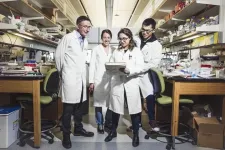Significant vaccine distrust found among incarcerated populations, increasing risks
2021-04-02
(Press-News.org) Fewer than half of inmates in jails and prisons surveyed in a study by the CDC and University of Washington said they would accept a COVID-19 vaccine, while the majority either said they wanted to wait before getting the vaccine or would refuse one.
"This is a population already at risk for COVID-19, and outbreaks among incarcerated people can worsen inequities in COVID-19 outcomes as well as contribute to spread in the surrounding community," said lead author Dr. Marc Stern, affiliate assistant professor of health services in the UW School of Public Health. "So culturally and health-literacy informed interventions are needed to help them feel more confident about getting vaccinated."
The study conducted by CDC researchers and led by Stern was published Wednesday on the CDC's Morbidity and Mortality Weekly Report. The researchers surveyed more than 5,000 inmates, men and women, in late 2020 from three prisons and 13 jails in Washington, California, Florida and Texas.
Among those asked about their willingness to receive a vaccine, only 45% said they were willing. More than 45% said they would refuse, and nearly 10% said they might or weren't sure they would receive it.
The most common reasons the participants gave for vaccine hesitancy fell into the response categories of waiting for more information or to see others take it first, and efficacy or safety concerns. The most common reason for given for refusal was distrust of the health care system, correctional or government personnel and institutions.
The survey was conducted before vaccines were available, but at the time Black and younger respondents were the least willing to get the vaccine. The researchers added that a lower willingness to receive a vaccine among Black participants was "not unexpected given historical mistreatment and higher rates of distrust" of these institutions.
"People of color are subject to a 'double whammy' -- they are at higher risk of serious illness from COVID-19 and they are disproportionately incarcerated, living in facilities where they are more likely to become infected," Stern said.
"I hope this study sheds light on the need to find ways of assuring high levels of vaccination of incarcerated individuals," Stern added, "not just for their own health, but for the health of the community. Vaccinating incarcerated individuals not only decreases the risk that officers and other staff will bring COVID-19 home to their family, friends and community, it is also an efficient way to vaccinate a large number of people who are otherwise hard for public health providers to reach once they return to their communities."
INFORMATION:
Co-authors include Alexandra Piasecki, Priti Patel, Rena Fukunaga and Nathan Furukawa from the CDC COVID-19 Response Team; Poornima Rajeshwar, Erika Tyagi and Sharon Dolovich from University of California, Los Angeles; and Lara Strick, at the UW and the Washington State Department of Corrections.
ELSE PRESS RELEASES FROM THIS DATE:
2021-04-02
As the COVID-19 pandemic lingers, researchers have found associations between certain lifestyle factors and a person's risk of getting infected. While it has already been established that those with Type II diabetes and a high body mass index (BMI) are at greater risk of experiencing hospitalizations and other severe complications related to COVID-19, they are also at greater risk of getting symptomatic infection in the first place. That is the finding of a recent study conducted by researchers at the University of Maryland School of Medicine that was published today in the journal PLoS ONE.
Using data from the UK Biobank of 500,000 British volunteers over age 40, the researchers examined ...
2021-04-02
ROCHESTER, Minn. -- All too often, patients with high levels of antibodies face major challenges getting a transplant. These highly sensitized patients have a much higher risk of death while waiting for suitable organs they are less likely to reject. But there is new hope for highly sensitized patients in need of a combined heart and liver transplant, thanks to an innovative surgical approach at Mayo Clinic.
Traditionally, surgeons transplant the heart first, followed by the liver. But Mayo Clinic heart transplant team decided to reverse the order for highly sensitized patients in the hopes that the liver would absorb some of the patient's antibodies, removing them from circulation and lowering ...
2021-04-02
Researchers have confirmed for the first time that Pine Island Glacier in West Antarctica could cross tipping points, leading to a rapid and irreversible retreat which would have significant consequences for global sea level.
Pine Island Glacier is a region of fast-flowing ice draining an area of West Antarctica approximately two thirds the size of the UK. The glacier is a particular cause for concern as it is losing more ice than any other glacier in Antarctica.
Currently, Pine Island Glacier together with its neighbouring Thwaites glacier are responsible for about 10% of the ongoing increase in global sea level.
Scientists have argued for some time that this region of Antarctica could reach a tipping point and undergo an irreversible ...
2021-04-02
Kidney development is a balancing act between the self-renewal of stem and progenitor cells to maintain and expand their numbers, and the differentiation of these cells into more specialized cell types. In a new study in the journal eLife from Andy McMahon's laboratory in the Department of Stem Cell Biology and Regenerative Medicine at the Keck School of Medicine of USC, former graduate student Alex Quiyu Guo and a team of scientists demonstrate the importance of a molecule called β-catenin in striking this balance.
β-catenin is a key driver at the end of a complex signaling cascade known as the Wnt pathway. Wnt signaling plays critical roles in the embryonic development of multiple organs including the kidneys. By partnering with ...
2021-04-01
Key Takeaways:
Discounting or couponing is not the most effective way to tap the power of retargeting in online marketing.
Customized seller recommendations may be more powerful than discounting.
Seller auctions that allow marketers to self-select in the retargeting process improve cost efficiency.
CATONSVILLE, MD, April 1, 2021 - Online marketers have seen the pattern: 95%-98% of online visitors search for something, but the search never converts into a purchase and they leave the site without buying. For marketers, this results in speculation and assumptions that can lead to wasted time and investments in ineffective marketing programs.
One of the more common ways online marketers attempt to solve this problem is to "retarget," which tracks those consumers and reconnects ...
2021-04-01
Boulder, Colo., USA: GSA's dynamic online journal, Geosphere,
posts articles online regularly. Locations studied this month include the
western Himalaya, the boundary between the southern Coast Ranges and
western Transverse Ranges in California, the northern Sierra Nevada, and
northwest Nepal.
Marine sedimentary records of chemical weathering evolution in the
western Himalaya since 17 Ma
Peng Zhou; Thomas Ireland; Richard W. Murray; Peter D. Clift
Abstract:
The Indus Fan derives sediment from the western Himalaya and Karakoram.
Sediment from International Ocean Discovery Program drill sites in the
eastern part of the fan coupled with data from an industrial ...
2021-04-01
Below please find a summary of a new article that is published in Annals of Internal Medicine today. The summary is not intended to substitute for the full article as a source of information.
Physicians must advocate for common sense gun laws for good of public health
#thisisourlane
FREE content: https://www.acpjournals.org/doi/10.7326/M21-1505
A pointed editorial by Douglas DeLong, MD, Chief of the Division of General Internal Medicine at Bassett Healthcare in Cooperstown, NY, suggests that it's time for physicians to move past talking and start taking ...
2021-04-01
The recent power outages in Texas brought attention to its power grid being separated from the rest of the country. While it is not immediately clear whether integration with other parts of the national grid would have completely eliminated the need for rolling outages, the state's inability to import significant amounts of electricity was decisive in the blackout.
A larger power grid has perks, but also has perils that researchers at Northwestern University are hoping to address to expedite integration and improvements to the system.
An obvious challenge in larger grids is that failures can propagate further -- in the case of Texas, across state lines. Another is that all power generators ...
2021-04-01
Telehealth has become a critical way for doctors to still provide health care while minimizing in-person contact during COVID-19. But with phone or Zoom appointments, it's harder for doctors to get important vital signs from a patient, such as their pulse or respiration rate, in real time.
A University of Washington-led team has developed a method that uses the camera on a person's smartphone or computer to take their pulse and respiration signal from a real-time video of their face. The researchers presented this state-of-the-art system in December at the Neural Information Processing Systems conference.
Now the team is proposing a better system to measure these physiological signals. This system is less likely to be tripped up by different ...
2021-04-01
SEATTLE (April 1, 2021) - An international consortium of geneticists, biologists, clinicians, mathematicians, and other scientists is determined to take the study of the human genome to the next level - creating a comprehensive atlas of genetic variants to advance the understanding, diagnosis, and treatment of disease.
"This Herculean undertaking is unprecedented," said Dr. Matthew Hurles, a geneticist at the Wellcome Sanger Institute in Cambridge, England. "Indeed, the scientific community has an increasingly comprehensive catalog of functional DNA elements in the human genome, but that catalog remains incomplete. We have collectively characterized the functional impact of less than 1% of genetic variation in the 1 to 2 percent of our DNA."
Hurles and Dr. Doug Fowler, a member of the ...
LAST 30 PRESS RELEASES:
[Press-News.org] Significant vaccine distrust found among incarcerated populations, increasing risks


